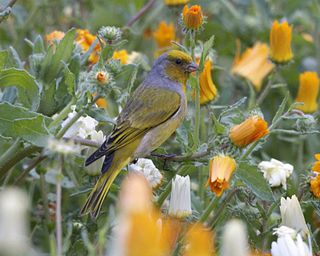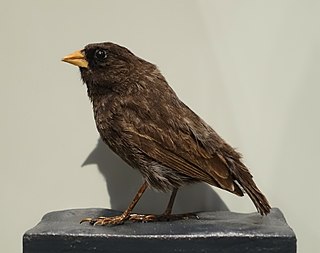
The vampire ground finch is a small bird native to the Galápagos Islands. It was considered a very distinct subspecies of the sharp-beaked ground finch endemic to Wolf and Darwin Islands. The International Ornithologists' Union has split the species supported by strong genetic evidence that they are not closely related, and divergences in morphology and song. Other taxonomic authorities still consider it conspecific.

The Asian crimson-winged finch is a pale-colored thickset finch with a heavy, dull yellowish bill. It is found from Turkey to NE Pakistan. The African crimson-winged finch was formerly considered conspecific and together known as the crimson-winged finch. It has an average length of 13 centimetres (5.1 in) and a wingspan of ca. 32 centimetres (13 in). It is light brown overall, with a whitish mid-belly, a black cap and a pinkish pattern on the wings and tail. The female is slightly duller than the male.

The Cape canary is a small passerine bird in the finch family. It is a resident breeder in southern Africa and has been introduced to Mauritius and Réunion.

The yellow-crowned canary is a small passerine bird in the finch family. It is a resident breeder in eastern Africa. It was formerly considered conspecific with the Cape canary.

The streaky-headed seedeater or streaky-headed canary is a small passerine bird in the finch family. It is an unobtrusive but widespread species in suitable habitats of southern Africa. Its presence in an area is revealed foremost by its callnotes.

The black-chinned quailfinch also known as the red-billed quailfinch, is a common subspecies of estrildid finch found in central Africa. It has an estimated global extent of occurrence of 450,000 km2. It is found in Angola, Burundi, the Republic of Congo, the Democratic Republic of the Congo, Equatorial Guinea, Gabon, Rwanda, Tanzania and Zambia. The IUCN has classified the species as being of least concern. Some taxonomists consider it to be conspecific with the other species of quailfinch.

The locust finch or locustfinch is a species of waxbill found in south-central and south-eastern Africa. It is the only species in the genus Paludipasser. It is sometimes placed in the genus Ortygospiza.

The yellow-bellied waxbill is a species of estrildid finch native to East Africa. The bird is now named yellow-bellied swee.

The black-necked eremomela is a species of bird formerly placed in the "Old World warbler" assemblage, but now placed in the family Cisticolidae.

The cuckoo-finch, also known as the parasitic weaver or cuckoo weaver, is a small passerine bird now placed in the family Viduidae with the indigobirds and whydahs. It occurs in grassland in Africa south of the Sahara. The male is mainly yellow and green while the female is buff with dark streaks. They lay their eggs in the nests of other birds.

The sharp-beaked ground finch is a species of bird in the Darwin's finch group of the tanager family Thraupidae. It is classified as a least-concern species by the International Union for Conservation of Nature and it is native to the Galápagos Islands in Ecuador. It has a mass of around 20 grams (0.71 oz) and the males have black plumage, while females have streaked brown plumage. This finch was described by Richard Bowdler Sharpe in 1888.

The chestnut-bellied seed finch is a species of bird in the family Thraupidae, but was until recently placed in Emberizidae.

The black-and-rufous warbling finch is a species of bird in the tanager family Thraupidae.

The quailfinch is a species of the estrildid finch. It is found in open grasslands in Africa. They are gregarious seed-eaters with short, thick, red bills. They are very terrestrial, with lark-like feet and claws.

Reichenow's seedeater is a species of finch in the family Fringillidae. It is sometimes considered conspecific with the black-throated canary.
The quailfinch indigobird is a small songbird. It is a resident breeding bird in The Gambia, Nigeria and Cameroon. It occurs in isolated localities, especially on river flood plains.

The African quailfinch, spectacled quailfinch, or white-chinned quailfinch, is a common species of estrildid finch found in eastern and southern Africa. Some taxonomists consider it to be conspecific with the black-faced quailfinch and the black-chinned quailfinch, others consider all three species to be conspecific.

The Angola waxbill is a species of estrildid finch endemic to Angola. Some taxonomists consider it to be conspecific with the swee waxbill.

The Genovesa cactus finch is a species of bird in the tanager family Thraupidae. It is one of Darwin's finches, and is endemic to the Galápagos islands, Ecuador, where it is restricted to Genovesa Island.

The Genovesa ground finch is a small bird native to the Galápagos Islands. It was considered a subspecies of the sharp-beaked ground finch endemic to Genovesa Islands. The International Ornithologists' Union has split the species. Other taxonomic authorities still consider it conspecific.




















